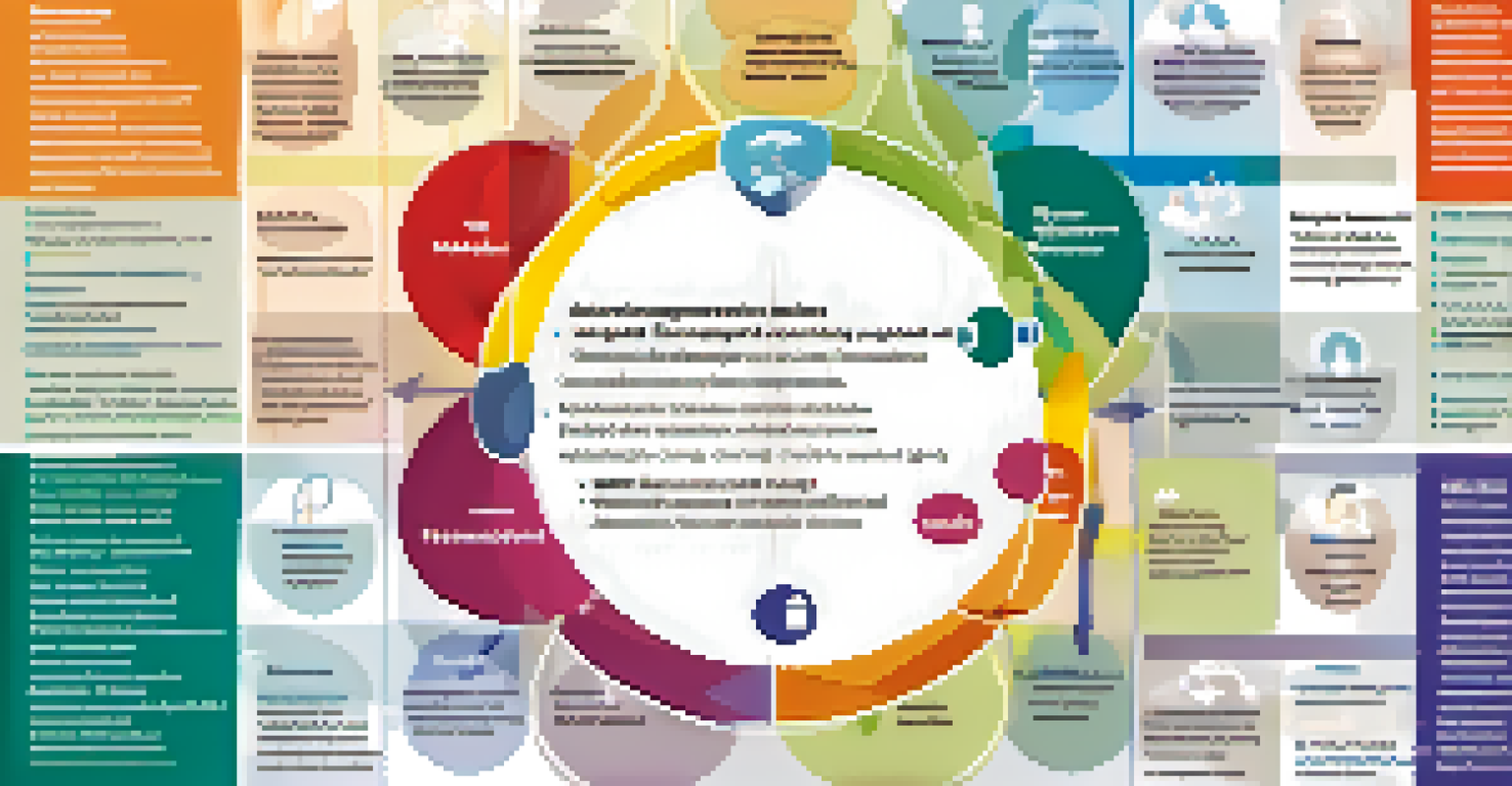Stakeholder Engagement in Health Policy Creation and Reform

Understanding Stakeholder Engagement in Health Policy
Stakeholder engagement is the process of involving individuals or groups who have a vested interest in health policy decisions. This can include healthcare providers, patients, community organizations, and government agencies. By actively involving stakeholders, policymakers can gain diverse perspectives that enhance the relevance and effectiveness of health policies.
The greatest challenge in communication is the illusion that it has been accomplished.
In health policy creation, engagement ensures that the voices of those directly affected are heard. For example, patient advocates can provide insights into the challenges faced by individuals navigating the healthcare system. This collaborative approach fosters trust and encourages a sense of shared responsibility among all parties involved.
Moreover, effective stakeholder engagement can lead to more sustainable health policies. When stakeholders feel their input is valued, they are more likely to support and promote those policies in their communities. This not only improves policy outcomes but also strengthens the overall health system.
The Role of Stakeholders in Policy Development
Stakeholders play a crucial role in the development of health policies by contributing their expertise and experience. For instance, healthcare professionals can share clinical insights that inform effective treatment guidelines. Similarly, community organizations can highlight social determinants of health that impact patient outcomes.

Involving stakeholders early in the policy development process can lead to more informed decisions. When diverse voices contribute, the resulting policies are more likely to address the needs of the community. For example, engaging with local organizations can reveal specific health challenges that require targeted interventions.
Engagement Enhances Health Policies
Involving diverse stakeholders leads to more relevant and effective health policy decisions.
Additionally, stakeholder engagement fosters collaboration among various sectors. By working together, stakeholders can align their goals and resources, creating a more cohesive approach to health policy. This synergy can result in innovative solutions that might not have emerged in isolation.
Effective Strategies for Engaging Stakeholders
To successfully engage stakeholders, health policymakers can use a variety of strategies. One effective method is holding public forums where community members can voice their opinions and share experiences. These gatherings not only provide valuable feedback but also create a sense of community ownership over health policies.
None of us is as smart as all of us.
Another strategy is to utilize surveys and questionnaires to gather input from a broader audience. This can be especially useful for reaching individuals who may not be able to attend in-person meetings. Anonymity can encourage more honest responses, leading to richer insights for policymakers.
Lastly, leveraging digital platforms for engagement can expand reach and accessibility. Online consultations and social media campaigns allow for real-time feedback and interaction. This modern approach can invigorate the policy-making process and make it more responsive to public needs.
Challenges in Stakeholder Engagement
Despite its benefits, stakeholder engagement in health policy can be fraught with challenges. One major hurdle is ensuring equitable representation among diverse groups. Often, certain voices, such as marginalized communities, may be underrepresented in discussions, leading to policies that do not fully address their needs.
Another challenge is managing conflicting interests among stakeholders. Different groups may have varying priorities, which can complicate consensus-building. For example, healthcare providers may prioritize clinical outcomes, while patients may focus on accessibility and affordability.
Collaboration Fosters Innovation
Working together with various stakeholders can result in creative solutions to complex health challenges.
Lastly, maintaining ongoing engagement can be resource-intensive. Policymakers must commit time and effort to keep stakeholders informed and involved throughout the policy lifecycle. This requires a strategic approach to communication and relationship management.
The Impact of Stakeholder Engagement on Policy Outcomes
Effective stakeholder engagement can significantly improve health policy outcomes. When policies reflect the needs and preferences of the community, they are more likely to be accepted and successfully implemented. This leads to better health outcomes and increased satisfaction among patients and providers alike.
Moreover, policies developed through stakeholder collaboration tend to be more innovative. By incorporating diverse perspectives, policymakers can explore creative solutions to complex health challenges. For instance, joint initiatives between health departments and local organizations can lead to unique community health programs.
In essence, engaging stakeholders not only enhances the quality of health policies but also ensures their sustainability. Stakeholders who feel involved are more likely to advocate for and support these policies, fostering a healthier society overall.
Case Studies of Successful Stakeholder Engagement
Looking at real-world examples can provide valuable insights into effective stakeholder engagement. One notable case is the development of the Affordable Care Act (ACA) in the United States, which involved extensive consultations with various stakeholders, including insurance companies, healthcare providers, and patient advocacy groups. This collaboration helped address key issues and ultimately led to more comprehensive healthcare coverage.
Another example is the World Health Organization's (WHO) initiatives on global health policy, which often rely on stakeholder involvement from different countries. By engaging local communities, WHO can tailor health interventions to better fit cultural contexts and specific health needs.
Challenges Must Be Addressed
Equitable representation and managing conflicting interests are crucial for successful stakeholder engagement.
These case studies highlight the importance of collaboration and shared decision-making in health policy. They demonstrate that when stakeholders come together, the resulting policies are not only more effective but also more widely supported.
Future Directions for Stakeholder Engagement in Health Policy
As health policy continues to evolve, so too must the approaches to stakeholder engagement. The rise of technology offers new avenues for connection and collaboration, allowing for more inclusive participation. Virtual platforms can bridge geographical gaps, enabling stakeholders from diverse backgrounds to contribute their insights.
Additionally, future engagement efforts should prioritize education and capacity-building. Empowering stakeholders with knowledge about the policy-making process can enhance their ability to contribute meaningfully. For instance, training sessions on health policy issues can equip community leaders to better advocate for their constituents.

Ultimately, the future of stakeholder engagement in health policy will depend on adaptability and responsiveness. As health challenges grow increasingly complex, fostering an inclusive dialogue will be essential for developing effective, equitable solutions.